STOP THE DEATHS CAUSED BY CLANDESTINE ABORTIONS!
For the right for legal, safe and free abortions
Latin America has the highest rate of abortions under dangerous conditions: almost 4 million a year. It’s evident that the region’s illegal abortion policy doesn’t stop self-induced and clandestine abortions from happening, which puts millions of women’s lives at risk. The majority of these women are young, adolescents, workers and poor.
During the last few decades, religious fundamentalism has left its mark in our region the churches, neoliberal governments as well as the political opposition that represents bosses interests, oligarchies and pro-imperialists, have put into place a rightwing policy against women’s basic democratic rights. Latin American women have a long history of fighting for abortion rights, confronting the rightwing, Church and politicians, reactionaries and clericals. However, the “post-neoliberal” governments that are now in power throughout the region raised expectations in large sectors of women’s movements, which have collided with the harsh reality: these governments, who call themselves “progressives,” have done nothing to stop the brutal “femicide” caused by clandestine abortions in our continent. What’s even worse is that these governments eco the church and reactionary groups brutalities. We may see this reflecting in the government’s declarations, their deferential statements against abortion rights when confronted and pressured by the right-wing, and above all the undeniable fact that abortions are still illegal.
The so called “progressive” governments continue to prohibit the fundamental democratic right to make decisions about our own bodies and our own lives. This has permitted and legitimized the death of 5 thousand Latin American women, torn up in blood, which finds it’s fatal victims among our poorest sisters in the continent.
In Argentina, they don’t even respect the legislation that permits abortions when a women’s health is in jeopardy. The justice system, the minister of Health, and the president Cristina Fernández have pronounced, in several occasions, their disapproval of this fundamental right. Under pressure from the Church and other reactionary sectors, they even impeded therapeutic abortions for abused girls and raped women; they are responsible for the death of more than 400 women each year in this country due to clandestine abortions.
In Chile, prohibited by the Pinochet dictatorship, abortions are illegal in any situation since 1989, which makes Chile one of the most restrictive countries in this matter. The rightwing and the Church maintain a lot of power over political decisions: in 2008 they stopped the “Morning-After Pill” from being sold in public health clinics. The “Concertación” government supportsthis initiative but now in the middle of the electoral campaign they say that they’re ready to discuss therapeutic abortion, while they have maintained the anti-abortion legislation that was put in place during the dictatorship, which has killed hundreds of women because of the clandestine abortions. The president Bachelet, who since the beginning has been against legalizing abortion, presented the morning-after-pill as the solution to adolescent pregnancies. However, now she doesn’t speak out against the court ruling that was won by the rightwing and the Church against this fundamental working, young and poor women’s right: taking away the morning-after-pill and guaranteeing the continuation of misery.
In Brazil, the Pernambuco church, with support from the Vatican, says that abortion is worse than rape. They excommunicated the doctors and mothers who were responsible for helping a 9 year old girl have an abortion, after she was raped by her step father and left pregnant with twins. On the one hand, President Lula says that abortion is a matter of public health, but on the other hand, he reassures the Church that he doesn’t see a need for Congress to pass a law legalizing abortion, since it’s already permitted in the two exceptional cases of (rape and if the women’s health is in jeopardy). Furthermore, in Southern Mato Grosso, after the persecution of 10.000 women for having had clandestine abortions, the Parliamentary Commission of Investigations over Abortions in the House of Chambers and the campaign in defense of fetuses without brains gave Brazil the title of the “model fight against abortion rights” and it will be the headquarters, in 2010, for the World Pro-Life Forum.
In Uruguay, in Novemember 2008, the current president Tamabré Vázquez, as was mentioned earlier, vetoed the legislation - that had been passed by both legislative cameras- to legalize abortions for women within the first 12 weeks of pregnancy. Despite the mobilizations and the protests against the presidential veto, it wasn’t overturned. It would have been the only point in his electoral campaign in which he would have kept to his word!
In Rafael Correa’s Ecuador, abortion is considered a crime. During the inauguration of the Constitute National Assembly, in 2007, the Ecuadorian president announced that he was against the legalization of abortion. The following year, to clarify and reassure the Church, the government highlighted they would not recognize abortion as legal in the new constitution. “I have never understood statements like ‘my body, my choice,’ when it’s clear that the embryo, fetus or baby that a mother carries, is no longer a part of her body,” declared Correa, adding that he would vote against the constitution “in the case that the new Constitution were to approve the prenatal euthanasia.”
In Bolivia, abortion is penalized with three years in prison for women who give consent. In the constitute assembly that to reestablish the country, which was rhetoric used by the ruling party, there was a proposal for sexual and reproductive rights, which were elaborated by women’s groups, NGO’s, indigenous women, feminist collectives and independents. These groups proposed specifically that the new legislation would legalize abortions, right to personal privacy, right to make decisions about your own body and motherhood, pleasure and eroticism free and voluntary. Facing this proposal, president Evo Morales was accused by the Church and extreme rightwing sectors that through the new constitution he wanted to legalize abortion. The president quickly came out to defend these “slanders,” denying that this was part of his plan and declaring that his government would defend “the culture of life.”
In Nicaragua, since October 2006, abortion is illegal under any circumstance, even for a minor who has been raped. Daniel Ortega, the current Nicaraguan president, took a step backwards in history; in a terrible agreement made with Church’s most reactionary sector in order to gain their support in latest elections, he revoked the law that had existed since 1893. Having been charged of sexual abuse by his stepdaughter, Daniel Ortega advocates the persecution of sectors of the feminist movement who fight to legalize abortion within their country.
In Venezuela, it appears that “Socialism of the 21st century,” doesn’t include women’s rights: their president, Hugo Chavez, has publicly expressed that he’s against abortion. Chavez along with some Chavist members of parliament, who have also manifested against the fundamental right to abortion, have prevented the legislation to legalize abortion from moving forward. Chavez’s argues against the legislation under the pretext that supporting the measure could seriously affect his electoral base and that he would also lose support from the evangelical church.
El Salvador, where the FLMN has recently won elections, Mauricio Funes, the current president, has promised, in front of different representatives of the church, that he would eradicate the country’s high abortion rate, declaring: “I’m not going to support any kind of initiative that is directed towards legalizing abortion… I’ve already said no, I can’t be any clearer than that.” It’s very clear.
That’s why we demand
No one more death caused by clandestine abortions!
Sexual education in every grade in public schools
Free contraceptives
Legal, free and safe abortions in public hospitals so that they are no more deaths
Separation of State and Church
Signed by
Pan y Rosas (Argentina)
Pan y Rosas – Teresa Flores (Chile)
Pão e Rosas (Brasil)
skip to main |
skip to sidebar


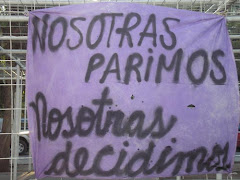
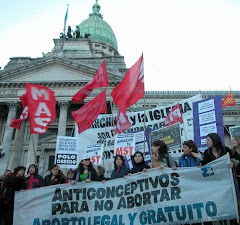.jpg)
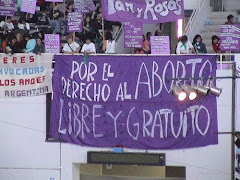


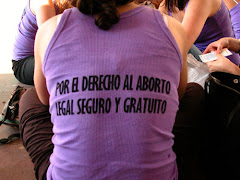

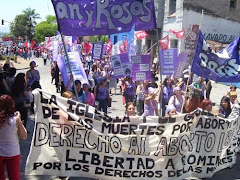
Estar en contra del derecho al aborto no es estar a favor de la vida, sino a favor del aborto clandestino. Estar contra o direito ao aborto não é estar a favor da vida, mas a favor do aborto clandestino. Opposing abortion rights, isn't supporting life, it's supporting clandestine abortions.
Seguidores
El mapa del derecho al aborto
Ayudanos a construir el mapa del derecho al aborto enviando tus noticias, declaraciones, convocatorias, videos, etc a campanhalatinoamericana@gmail.com
Ver El mapa del aborto clandestino en un mapa más grande
Ver El mapa del aborto clandestino en un mapa más grande
Sitios relacionados



.jpg)






